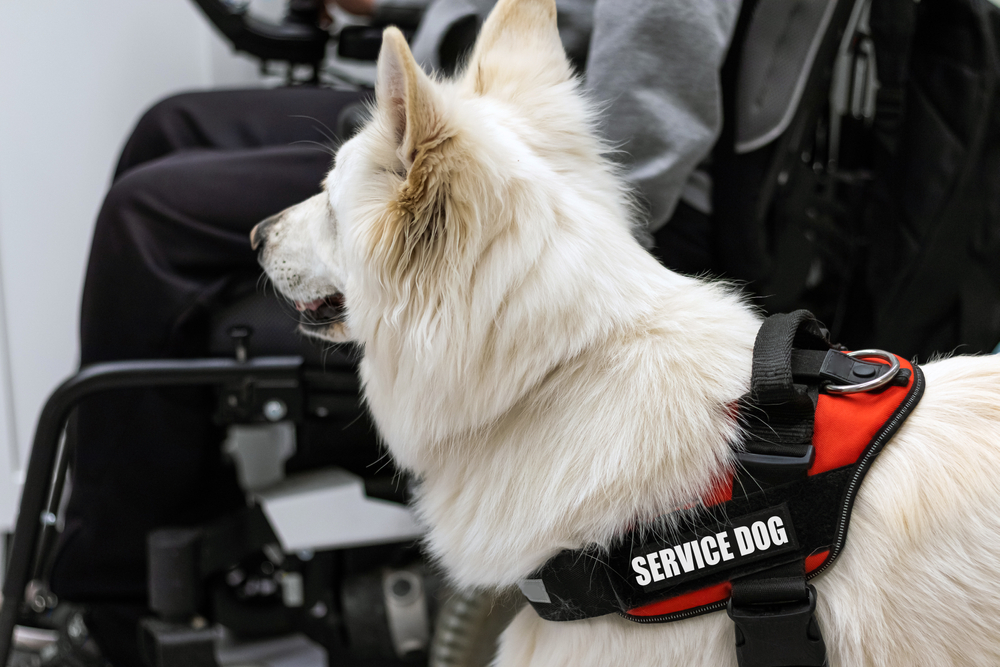People with disabilities may qualify for certain tax deductions, income exclusions and credits, according to the IRS website. Approximately half a million service dogs currently help people with disabilities in the United States and, so, some taxpayers may wonder: Is a service animal tax deductible? Whether this million-dollar question directly applies to you or if you’re just a curious cat… the answer is yes! A service animal is tax deductible.
What is a Service Animal?
Under the Americans with Disabilities Act (ADA), a service animal is defined as a dog that has been individually trained to do work or perform tasks for an individual with a disability. For some persons with disabilities, service animals better afford participation in daily life (and perhaps more independently so).
The IRS definition, however, indicates that service animals aren’t limited to dogs. It states that a service animal is any guide dog, signal dog or other animal trained to assist a person with a disability. It’s important to note that service animals are not just pets but, rather, working animals.

The IRS lists the following as task examples of service animals:
- guiding people who are blind and/or low-vision,
- alerting people who are deaf or hard-of-hearing to sounds,
- pulling a wheelchair,
- carrying and picking up things for persons with a mobility impairment,
- alerting and protecting a person who is having a seizure,
- reminding a person with a mental impairment to take prescribed medications,
- calming a person with Post Traumatic Stress Disorder (PTSD), and
- other disability-related tasks.
How is a Service Animal Tax Deductible?
Individuals with disabilities may be able to withhold certain medical expenses that exceed 7.5% of their adjusted gross income. [This is the threshold for 2022, which may change for future years.] These fees may correlate to equipment, therapy, transportation to and from medical appointments. For people who have a service animal specifically for disability tasks, the cost of ownership – i.e. cost of buying, training and maintaining a service animal – is considered a tax deductible medical expense. In general, the itemized costs may include food, grooming, veterinary care and animal equipment (harnesses, vests, leashes, etc.)
Taxpayers writing-off a service dog will likely need proof, like a doctor’s prescription and even formal listing on a service animal registry. Proper documentation notating that the service animal is certified and trained to help with one’s specific disability-related tasks may also be required.
While a service animal is tax deductible, therapy and/or emotional support animals are not; nor are standard pets. Basic pet-related costs are considered personal expenses; and pets cannot be deemed as dependents.

Why is a Service Animal Tax Deductible?
The costs (direct and indirect) of living with a disability in the U.S. are, generally speaking, higher when compared to expenses of persons without disabilities. Owning a service dog is just one hefty example of an added expense within the disability community.
The lofty initial cost of purchasing a service dog, according to Service Dog Registration of America, ranges between $15,000 and $30,000 after training. Presently in the U.S., no major insurance covers the expense of a service animal; thus, tax write-offs help.
Essentially, service dogs do not serve as pets but more so as medical devices or aids (according to the government; and, therefore, taxed as such.)
Tax Deductions Beyond Service Animals
People might be eligible to write-off other animal-associated expenses. For example, deductions could potentially apply for:
- fostering pets,
- guard dogs and/or business animals, or
- taxable income from pets (i.e. breeding, show animals, etc.).
More about Service Dogs
The ADA requires places to allow service animals to accompany persons with disabilities in all areas where members of the public are allowed to go. Because of this protection, one should not be asked to leave a premise solely because of the use of a service animal unless the animal is not controlled or housebroken.
Service animals are expected to harnessed, leashed or tethered unless doing so interferes with the disability tasks at hand.
Note: This article is not intended to serve as financial guidance. Individuals – with and without disabilities – should consult a qualified tax professional and adhere to IRS guidelines.
Looking for additional articles with similar content? Read:






